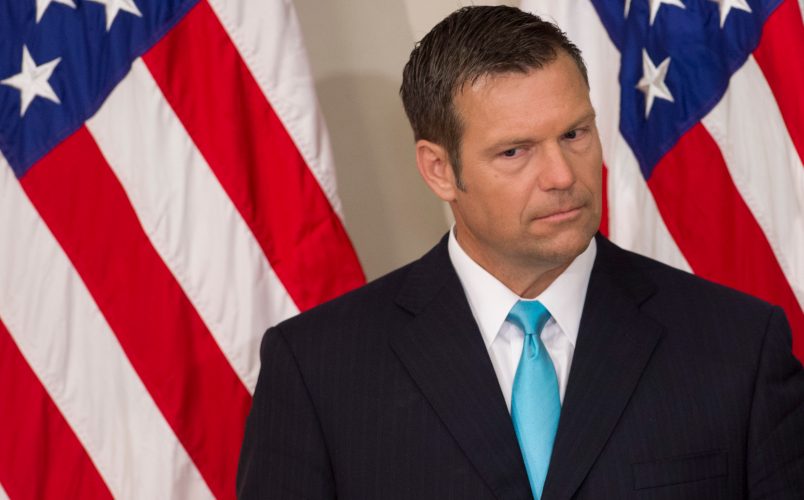The 10th U.S. Circuit Court of Appeals ruled against Kansas’ proof-of-citizenship voter registration requirement in a decision issued Wednesday.
The appeals court backed the trial judge’s finding that the requirement, which was championed by then-Kansas Secretary of State Kris Kobach (R), violated both the Equal Protection clause of the Constitution and the National Voter Registration Act.
The appeals court pointed to the record that been established during the 2018 trial that showed that some 30,000 Kansans were removed from the rolls due to the requirement. Kobach — who led the trial arguments for the state — could only provide 39 examples of noncitizens being registers to vote in Kansas within the last 19 years.
The appeals court concluded that the “significant burden” that the law was shown to impose on voters was not justified by the “incredibly slight evidence that Kansas’s interest in counting only the votes of eligible voters is under threat.”
“[W]e agree with the Secretary that Kansas’s interest in counting only the votes of eligible voters is legitimate in the abstract, but, on this record, we do not see any evidence that such an interest made it necessary to burden voters’ rights here,” the appeals court said.
Much of the opinion focused on distinguishing the Kansas case from a 2008 Supreme Court ruling okaying an Iowa voter ID requirement.
The 10th Circuit said that Kansas’ back-up plan for voters who didn’t have proof of their citizenship — in which they were required to participate in a board hearing with top state officials — was not comparable to the “safety valve” laid out in the Iowa law, which let voters without ID sign affidavits affirming their identity.
The Kansas procedure procedure “has only been used five times,” the appeals court noted, “and we agree with the district court’s finding that its byzantine nature ‘adds, not subtracts, from the burdensomeness of the law.’”
A spokesperson for Kansas’ Attorney General’s office, which took over arguing the case when it was at the appellate phase, told TPM in an email that the office was “evaluating the court’s opinion and will consult with the Secretary of State on next steps.”
When Kobach was secretary of state, he made clear his plans to appeal the case all the way up to the Supreme Court if need be. Kobach lost his 2018 gubernatorial bid and is now running for U.S. Senate.
On Twitter, Kobach promised that, if appealed to the Supreme Court, “it is highly likely that the high court will overturn the decision.”
His successor in the Kansas secretary of state’s office has backed off Kobach’s aggressive approach somewhat. For instance, the current secretary of state, Scott Schwab, voluntarily relinquished the voter fraud prosecutorial powers Kobach had fought for when he was Kansas’ top elections official.
One of the three appellate court judges who heard the arguments in the case died last month and did not participate in the final decision. The opinion was written by Judge Jerome Holmes, a George W. Bush-appointee, and Holmes was joined by Judge Mary Beck Briscoe, a Clinton appointee.
Read the opinion below:







As I understand it, judges still can’t use sound effects in official documents.
sad trombone
Sucks to be you these days, Kris. Or any day.
Poor Kris. Poor, poor Kris.
He lost to a girl and then this.
Has Mr. Kobach had any of his pet initiatives around voting and voting restrictions accepted by the courts? The man is, how can I say this, not the sharpest knife in the drawer if you know what I mean.
Doesn’t matter…this is going straight to the Fascist Five for more gutting of the VRA. That’s the whole point.
But her emails…